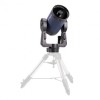Meade LX200-ACF 12 inch User Manual - Page 60
Description String, Writing a Tour
 |
View all Meade LX200-ACF 12 inch manuals
Add to My Manuals
Save this manual to your list of manuals |
Page 60 highlights
- 60 - TITLE TEXT USER IC SAO MESSIER PLANET MOON SATELLITE COMET LUNAR ECLIPSE METEOR SHOWER CONSTELLATION STAR LANDMARK PICK ONE/PICK END AUTO SLEW ON/OFF NGC CALDWELL ASTEROID DEEP SKY DEFINE #END Description String: Description of an object. Must be surrounded by quotation marks. If the description is longer than one line, each line must end with a quotation mark and a hard return. Begin the next description line with a quotation mark. If quotation marks are to be displayed in the on-screen description, use two quote marks at the beginning and end of the desired phrase. For example: "The Orion Nebula is considered ""awesome"" by many who view it". Writing a Tour Using the list of commands listed above, a custom tour can be created. Placing the word AUTO SELECT before any of the command lines activates Automatic Mode and, when selected, AutoStar II automatically searches and finds the designated object. The following is a list of command lines, complete with keywords and necessary strings: TITLE Title must be the first keyword in your tour after any comment lines and must be 15 characters or less. AutoStar II displays this title when "Guided Tour" is selected from the menus. For example: TITLE "A Star's Life" TEXT "title string" "description string" This command allows you to display a text title and description. USER ra dec "title string" "description string" This command line allows you to access a specific object with your own description. Enter USER, then the R.A. and Dec. of a desired object, and its title and description. Use the format described in the Command Line section. The following commands specify objects that are already in the AutoStar II database. If these commands follow the command AUTO SELECT, the object's title displays on line 1 and its description scrolls across line 2. Do not add a description string after the following command lines; these commands access objects with existing description in the AutoStar II database. NGC xxxx Enter NGC followed by the desired New General Catalog number and AutoStar II provides the user with a description of the object from its database. For example: NGC 4256 IC xxxx Enter IC followed by the desired Index Catalog number and AutoStar II provides the user with a description of the object from its database. For example: IC 1217 SAO xxxxxx Enter SAO followed by the desired SAO number and AutoStar II provides the user with a description of the object from its database. For example: SAO 30200 Messier xxx Enter MESSIER followed by the desired Messier number and AutoStar II provides the user with a description of the object from its database. For example: M 101 CALDWELL xxx Enter CALDWELL followed by the Caldwell number and AutoStar II provides the user with a description of the object from its database. For example: CALDWELL 17















